Book 8U4语法
Book 8 Unit4 Grammar教学设计

Book 8 Unit4 Grammarthe Past Participle as the adverbialTeaching aims:1.knowledge competences1)students can judge the basic usage of p.p2)students can remember the rules of p.p as adverbial and can use p.p to write some sentences.2. Thinking abilityStudents will promote their critical , logical ,imaginative and creative thought by learning the rules of p.p as adverbial.3.Cultural awareness:Students will develop their awareness of cultural self confidence in spreading our excellent cultural production.4.Learning ability:Students will have a better habit of learning in class such as cooperating, self thinking and listening carefully.* The key points: The rules of p.p as adverbial*The difficult points: How can use p.p as adverbial in proper situations and understand the difference between v-ed and v-ing as adverbial.*Teaching methods: communicating, situational teaching, activity -based teachingStep1 lead inGive students some sentences and pictures and ask them to guess.(students will be interested in the pictures and eager to learn) Step 2 group workAsk students to work in groups and try to do some discovery Discovery 1用下列所给动词的适当形式填空。
人教英语八年级上册u4知识点

人教英语八年级上册u4知识点人教英语八年级上册Unit 4知识点Unit 4 在人教版英语八年级上册中,是一个涉及音乐的单元,同学们需要学习与音乐相关的词汇、表达方式和句型,同时也需要掌握一些基本的语法知识。
在这篇文章中,我们将会为大家总结出 Unit 4 的重点知识点。
Section A1. music styles and instruments在这个单元的第一节课中,同学们需要学习到一些音乐类型,比如 rock, pop, jazz, blues, classical等等。
除此之外,你还需要掌握这些音乐类型所使用的一些乐器,比如电吉他、键盘、小提琴等等。
2. grammar:too + adj.另外,同学们还需要注意到一个语法结构,在这个单元中,我们学习到了 too + adj.这个结构的用法。
这个结构可以用来表达“太……了”、“过于……”的意思,例如:- The music is too loud. 这音乐太吵了。
- The movie is too boring. 这电影太无聊了。
Section B1. talking about music在第二节课中,我们需要学习一些用来谈论音乐的表达方式,包括表达自己喜欢的音乐、描述音乐的特点、评论音乐等。
以下是一些例句:- I love pop music. 我喜欢流行音乐。
- This song has a catchy melody. 这首歌曲有一个容易上口的旋律。
- The band played well. 这个乐队演奏得非常好。
2. grammar:comparative adjectives在这一课中,我们还需要学习比较级的用法,这个语法知识在英语学习中非常重要,而且经常被考察。
同学们需要关注以下这些点:- 一些形容词和副词的比较级需要进行改变,比如big - bigger, good - better等等。
- 一些词语在比较级结构中需要使用than,例如:She is taller than her friend.Section C1. describing music在第三节课中,我们需要学习如何描述音乐,比如节奏、旋律、歌词、歌手等等。
八年级下册英语Unit4语法解析
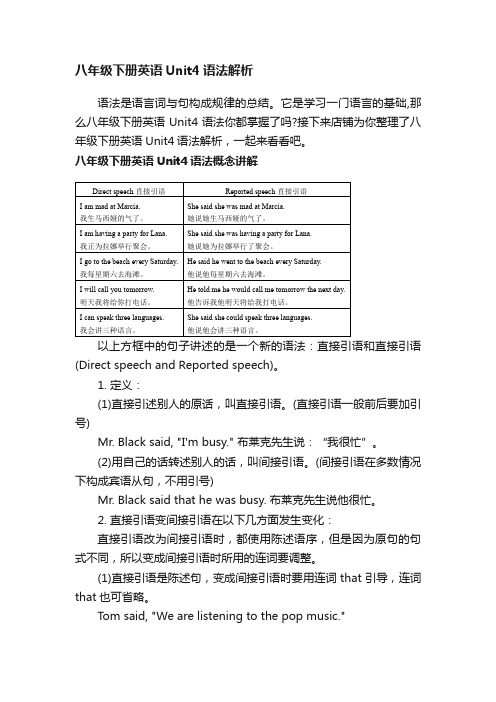
八年级下册英语Unit4语法解析语法是语言词与句构成规律的总结。
它是学习一门语言的基础,那么八年级下册英语Unit4语法你都掌握了吗?接下来店铺为你整理了八年级下册英语Unit4语法解析,一起来看看吧。
八年级下册英语Unit4语法概念讲解以上方框中的句子讲述的是一个新的语法:直接引语和直接引语(Direct speech and Reported speech)。
1. 定义:(1)直接引述别人的原话,叫直接引语。
(直接引语一般前后要加引号)Mr. Black said, "I'm busy." 布莱克先生说:“我很忙”。
(2)用自己的话转述别人的话,叫间接引语。
(间接引语在多数情况下构成宾语从句,不用引号)Mr. Black said that he was busy. 布莱克先生说他很忙。
2. 直接引语变间接引语在以下几方面发生变化:直接引语改为间接引语时,都使用陈述语序,但是因为原句的句式不同,所以变成间接引语时所用的连词要调整。
(1)直接引语是陈述句,变成间接引语时要用连词that引导,连词that也可省略。
Tom said, "We are listening to the pop music."→Tom said that they were listening to the pop music.(2)直接引语是一般疑问句,变成间接引语时要用连词if或whether引导。
从句再改成陈述句语序,时态随主句的时态而变化。
主句中的谓语动词为said时,要改为asked. 没有间接引语时,可以加一个间接宾语(me, him或us等)。
"Do you know where she lives?" he asked.→He asked if / whether I knew where she lived.(3)直接引语是特殊疑问句,变成间接引语时用相应的疑问词引导,从句要改成陈述句语序,时态随主句的时态而变化。
人教版高中英语第八册第四单元语言知识点 B8U4 language points(共35张)
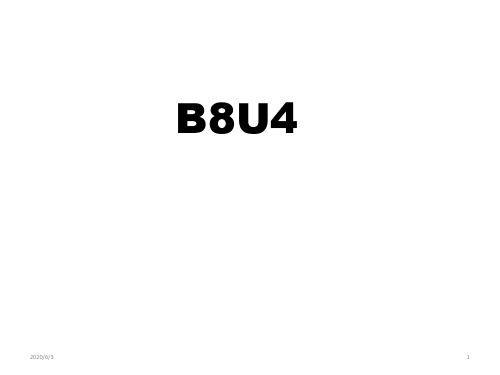
be convinced of/that/to do 确信
2020/6/3
8
【Translation】 (1)他令我相信他是无辜的。
He convinced me of his innocence.
(2) 我确信他有罪。 I am convinced of his guilt. I am convinced that he was guilty.
make one’s acquaintance
21. 一把…… a handful of
22. 惊谔地 in amazement/to one’s ~
2020/6/3
4
Unit 4 Language points
2
5
1. adaptation n. 适应(性);改编本 adapt v. ~ to 适应 / from改编
2020/6/3
6
2. classic adj. 经典的; 第一流的 n. 经典著作
_c_l_a_s_si_c_a_l____ adj.古典的
1) The novel may become a modern _c_l_a_s_s_ic_. 2) You have made a __c_l_a_s_s_ic_ mistake. 3)The little girl seems to enjoy _c_la_s_s_i_c_a_l
B8U4
2020/6/3
1
Difficult and important expressions in reading 1
2020/6/3
2
1.……的改编 an adaptation of classic…
2.雄心勃勃的 be ambitious to
book8 uint 4 知识点
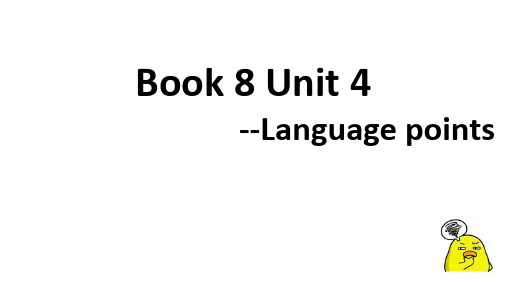
6. pass … off as… (把) 改变或冒充成……
In order to distinguish herself, the girl passed herself off as a well-known
film star.
为了给自己扬名,那个女孩冒充成一个著名的电影明星。
Review: pass 相关短语
由…改编
(1) He tried hard to adapt (himself) _t_o_____ the new school life.
(2)The new version has been ___a_d_a_p_t_e_d_(adapt) for a 4D film.
新的版本已经被改编成4D电影。
(1) He made a number of rude remarks about the food there. 他对那里的食物出作出了许多粗鲁的评论。
(2) The media remarked ___o_n____ the behavior of that singer. 媒体对那位歌手的表现作出了评论。
我在给他打电话之前还在犹豫是否支持他。
(4) Without ___h_e_s_i_ta_t_io__n(hesitate),he walked up to help the injured old woman.
3. classify vt. 把…分类;把…归类
be classified by/according to 根据…分类
(2)He was found guilty and condemned/sentenced to death. 他被裁定有罪并且判处死刑。
(3)In the classic film, the hero was condemned to a life of hardship. 在这部经典电影中,男主人公不得不过着艰难的生活。
Book 8 Unit 4
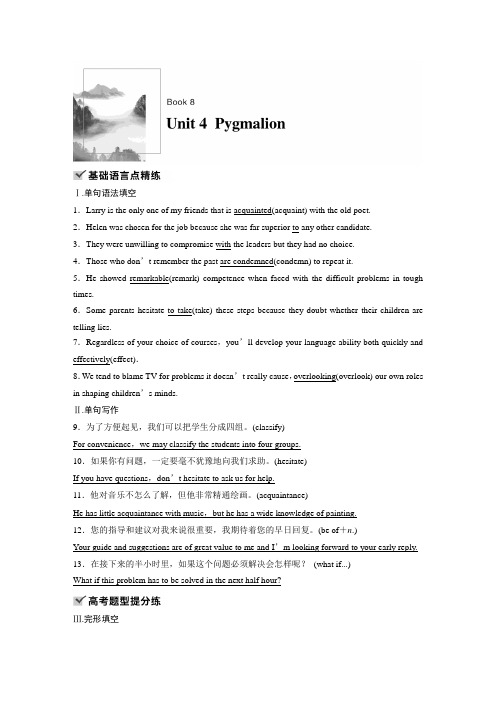
Ⅰ.单句语法填空1.Larry is the only one of my friends that is acquainted(acquaint) with the old poet.2.Helen was chosen for the job because she was far superior to any other candidate.3.They were unwilling to compromise with the leaders but they had no choice.4.Those who don’t remember the past are condemned(condemn) to repeat it.5.He showed remarkable(remark) competence when faced with the difficult problems in tough times.6.Some parents hesitate to take(take) these steps because they doubt whether their children are telling lies.7.Regardless of your choice of courses,you’ll develop your language ability both quickly and effectively(effect).8.We tend to blame TV for problems it doesn’t really cause,overlooking(overlook) our own roles in shaping children’s minds.Ⅱ.单句写作9.为了方便起见,我们可以把学生分成四组。
(classify)For convenience,we may classify the students into four groups.10.如果你有问题,一定要毫不犹豫地向我们求助。
book8unit4词汇
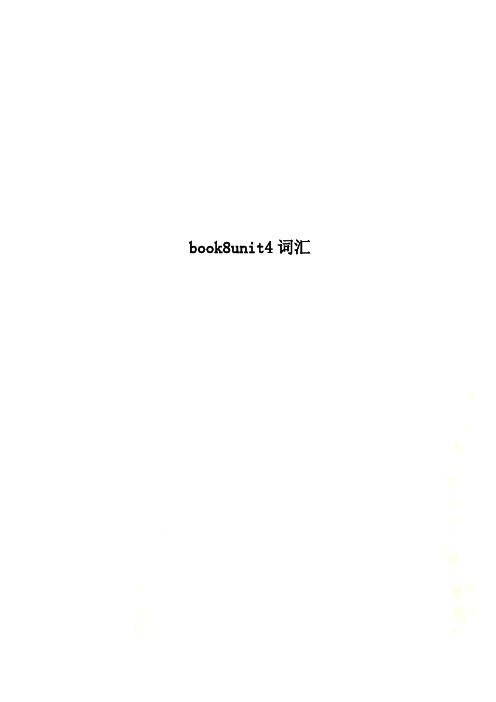
book8unit4词汇Book8 Unit4 PygmalionWarming up1. adaptation①.cn 改编本This play is an adaptation of a novel. 这一剧本是由小说改编的②.un 适应性He made a quick adaptation to the environment.We must better understand the adaptation of plants to their environment.adapt v 使适应; 改编, 修改adapt to \adapt oneself to\adjust to\fit in with 适应adapt sth. for 把…改编成…adapt sth. from 由…改编…Three of her novels have been adapted for television. 这部小说已经改编成了电视。
These styles can be adapted to suit individual tastes.2. classic①. adj. 典型的,有代表性的;经典的;最优秀的,第一流的;古典的,典雅的a classic example \case 典型实例Tom made a classic mistake of trying to drive away without releasing the handbrake.汤姆犯了一个典型的错误,就是没有松开手闸就想开车。
The coca-cola bottle is one of the classic designs of the last century.可乐瓶是上个世纪的经典设计之一。
a classic novel/study/goal最佳小说/论文/进球a classic grey suit 一套典雅的灰色服装②. cn. 经典作品,名著the Marxist classics 马克思经曲著作3. grant (formal) (指正式地或法律上,尤指官方授权)准予,允许,同意;承认, 认为grant sb. sth. 同意某人某事take sb.\sth. for granted认为…为当然take it for granted(that) 想当然的认为I shall grant him his request. 我同意他的要求。
Book8Unit4grammar (共18张PPT)
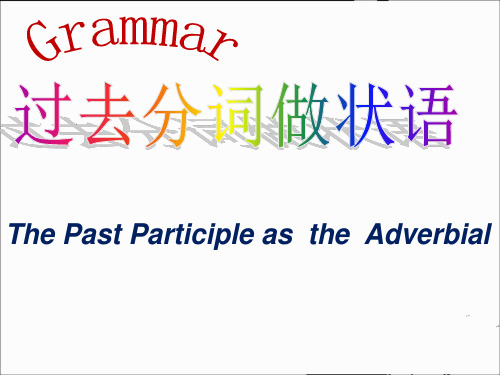
观察下列句子,找出句子中的作状语的分词和句子主语, 判断他们之间的关系,并总结规律: 1. Hit by a lack of fresh air, my head ached. 2. Asked what had happened, he kept silent. 3. Given more time, we would do the work much better. 4. Left alone at home, the little boy didn’t feel afraid at all. 5. Mr. Smith entered the classroom, followed by his students.
Summary 1: 过去分词(短语) 做状语,过去分词与句子主语
之间构成__被__动___ 关系
判断句子中的过去分词短语具体作什么状语(时间/原因/
条件/让步/伴随..),并试着把分词改写成句子作状语:
1. Hit by a lack of fresh air, my head ached.
原因状语
=Because my head was hit by …, it ached.
2. Asked what had happened, he kept silent. 时间状语
=When he was asked what …, he kept silent.
3. Given more time, we would can do the work much better.
穿着白色的衣服,这个女孩看起来像个天使。
思考: 过去分词作状语与现在分词作状语有
新人教版英语Book 8 Unit 4 Pygmalion知识点总结
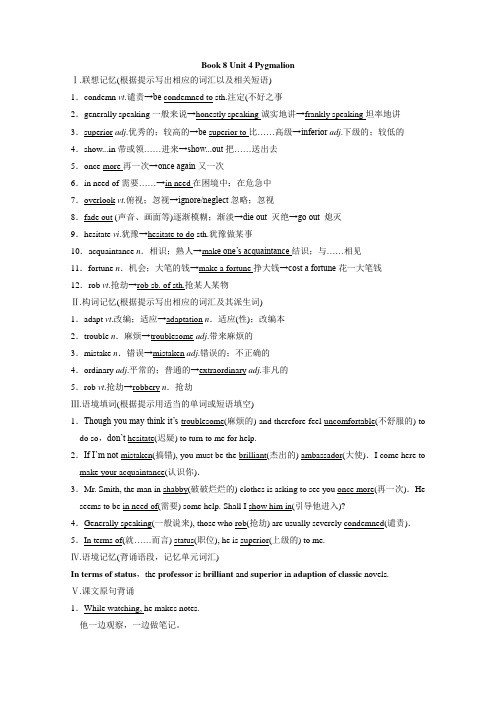
Book 8 Unit 4 PygmalionⅠ.联想记忆(根据提示写出相应的词汇以及相关短语)1.condemn vt.谴责→be condemned to sth.注定(不好之事2.generally speaking一般来说→honestly speaking诚实地讲→frankly speaking坦率地讲3.superior adj.优秀的;较高的→be superior to比……高级→inferior adj.下级的;较低的4.show...in带或领……进来→show...out把……送出去5.once more再一次→once again又一次6.in need of需要……→in need在困境中;在危急中7.overlook vt.俯视;忽视→ignore/neglect忽略;忽视8.fade out (声音、画面等)逐渐模糊;渐淡→die out 灭绝→go out 熄灭9.hesitate vi.犹豫→hesitate to do sth.犹豫做某事10.acquaintance n.相识;熟人→make one’s acquaintance结识;与……相见11.fortune n.机会;大笔的钱→make a fortune挣大钱→cost a fortune花一大笔钱12.rob vt.抢劫→rob sb. of sth.抢某人某物Ⅱ.构词记忆(根据提示写出相应的词汇及其派生词)1.adapt vt.改编;适应→adaptation n.适应(性);改编本2.trouble n.麻烦→troublesome adj.带来麻烦的3.mistake n.错误→mistaken adj.错误的;不正确的4.ordinary adj.平常的;普通的→extraordinary adj.非凡的5.rob vt.抢劫→robbery n.抢劫Ⅲ.语境填词(根据提示用适当的单词或短语填空)1.Though you may think it’s troublesome(麻烦的) and therefore feel uncomfortable(不舒服的) to do so,don’t hesitate(迟疑) to turn to me for help.2.If I’m not mistaken(搞错), you must be the brilliant(杰出的) ambassador(大使).I come here to make your acquaintance(认识你).3.Mr. Smith, the man in shabby(破破烂烂的) clothes is asking to see you once more(再一次).He seems to be in need of(需要) some help. Shall I show him in(引导他进入)?4.Generally speaking(一般说来), those who rob(抢劫) are usually severely condemned(谴责).5.In terms of(就……而言) status(职位), he is superior(上级的) to me.Ⅳ.语境记忆(背诵语段,记忆单元词汇)In terms of status,the professor is brilliant and superior in adaption of classic novels.Ⅴ.课文原句背诵1.While watching, he makes notes.他一边观察,一边做笔记。
八年级上册英语U4知识点

八年级上册英语U4知识点本文将为大家介绍八年级上册英语第四单元的重点知识。
该单元主要涵盖过去进行时、一般过去时和动词-ed的发音规则。
一、过去进行时过去进行时用于描述过去某个时间正在进行的动作或事件。
1. 构成:was/were + 动词的现在分词2. 用法:(1) 表示过去某个时间正在进行的动作或事件。
例如:I was doing my homework at 8 o'clock yesterday evening.(昨天晚上八点的时候我正在做作业。
)(2) 用于描述背景或环境。
例如:It was raining heavily while I was studying in my bedroom.(我在卧室学习的时候,外面下着大雨。
)二、一般过去时一般过去时用于描述过去某个时间发生的动作或事件。
1. 构成:动词的过去式2. 用法:(1) 表示过去某个时间内发生的动作或事件。
例如:I went to the supermarket last night.(昨晚我去了超市。
)(2) 用于描述动作或事件的发生顺序。
例如:I finished my homework and then went to bed.(我做完作业后就去睡觉了。
)三、动词-ed的发音规则在过去式和过去分词中,大部分动词的-ed发音是[t]或[d]。
1. [t]发音规则:(1) 结尾是清辅音(声带不振动的辅音,如:p、t、k、f、s 等),-ed发[t]音。
例如:asked [æskt],looked [lʊkt],danced [dænst]。
(2) 结尾是无音节元音+清辅音,如:-p、-k、-t等,-ed发[t]音。
例如:hoped [həʊpt],looked [lʊkt],waited [weɪtɪd]。
2. [d]发音规则:(1) 结尾是浊辅音(声带振动的辅音,如:b、d、g、v、z等),-ed发[d]音。
Book 8_U4_重点词汇讲解
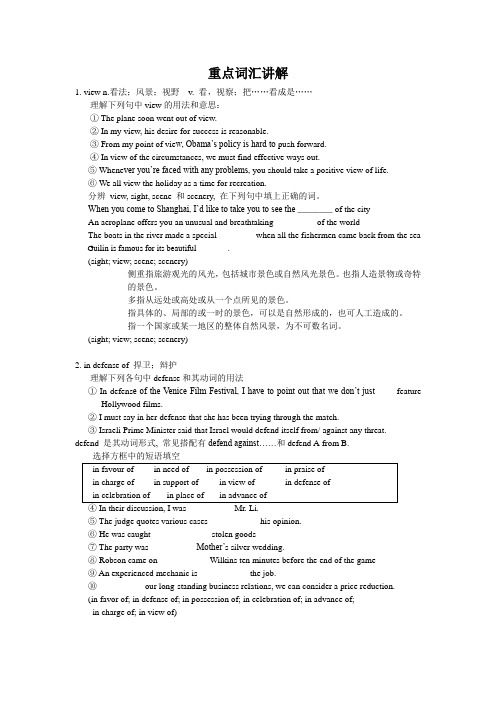
重点词汇讲解1. view n.看法;风景;视野v. 看,视察;把……看成是……理解下列句中view的用法和意思:① The plane soon went out of view.② In my view, his desire for success is reasonable.③ From my point of vie w, Obama’s policy is hard to push forward.④ In view of the circumstances, we must find effective ways out.⑤ Whene ver you’re faced with any problems, you should take a positive view of life.⑥ We all view the holiday as a time for recreation.分辨view, sight, scene 和scenery, 在下列句中填上正确的词。
When you come to Shanghai, I’d like to take you to see the________ of the cityAn aeroplane offers you an unusual and breathtaking _________ of the worldThe boats in the river made a special ________ when all the fishermen came back from the sea Guilin is famous for its beautiful _______.(sight; view; scene; scenery)________ 侧重指旅游观光的风光,包括城市景色或自然风光景色。
也指人造景物或奇特的景色。
八年级下英语Unit4 单元重点语法详解
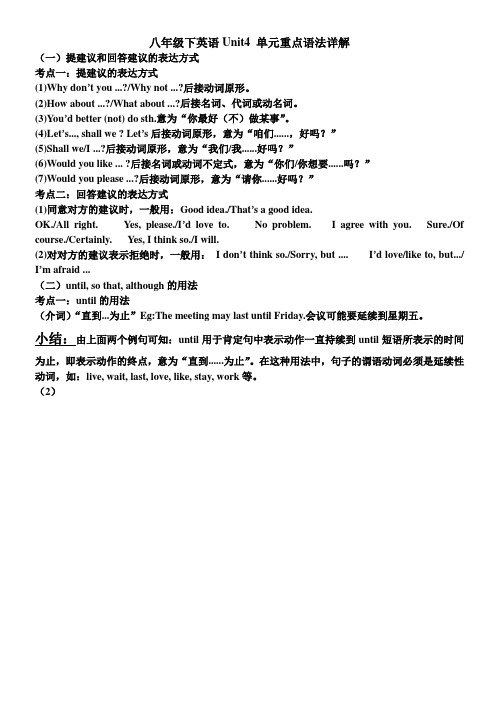
八年级下英语Unit4 单元重点语法详解(一)提建议和回答建议的表达方式考点一:提建议的表达方式(1)Why don’t you ...?/Why not ...?后接动词原形。
(2)How about ...?/What about ...?后接名词、代词或动名词。
(3)Y ou’d better (not) do sth.意为“你最好(不)做某事”。
(4)Let’s..., shall we ? Let’s后接动词原形,意为“咱们......,好吗?”(5)Shall we/I ...?后接动词原形,意为“我们/我......好吗?”(6)Would you like ... ?后接名词或动词不定式,意为“你们/你想要......吗?”(7)Would you please ...?后接动词原形,意为“请你......好吗?”考点二:回答建议的表达方式(1)同意对方的建议时,一般用:Good idea./That’s a good idea.OK./All right. Y es, please./I’d love to. No problem. I agree with you. Sure./Of course./Certainly. Y es, I think so./I will.(2)对对方的建议表示拒绝时,一般用:I don’t think so./Sorry, but .... I’d love/like to, but.../ I’m afraid ...(二)until, so that, although的用法考点一:until的用法(介词)“直到...为止”Eg:The meeting may last until Friday.会议可能要延续到星期五。
小结:由上面两个例句可知:until用于肯定句中表示动作一直持续到until短语所表示的时间为止,即表示动作的终点,意为“直到......为止”。
8AU4语法和词汇
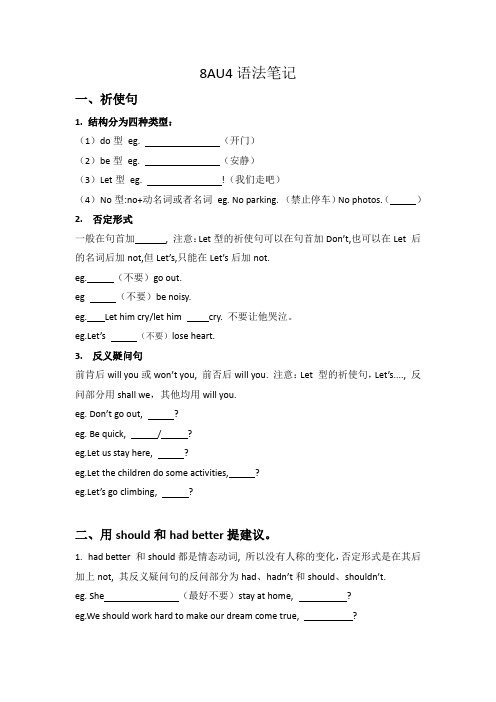
一、祈使句1.结构分为四种类型:(1)do型eg. (开门)(2)be型eg. (安静)(3)Let型eg. !(我们走吧)(4)No型:no+动名词或者名词eg. No parking. (禁止停车)No photos.()2.否定形式一般在句首加, 注意:Let型的祈使句可以在句首加Don’t,也可以在Let 后的名词后加not,但Let’s,只能在Let’s后加not.eg.(不要)go out.eg (不要)be noisy.eg.Let him cry/let him cry. 不要让他哭泣。
eg.Let’s (不要)lose heart.3.反义疑问句前肯后will you或won’t you, 前否后will you. 注意:Let 型的祈使句,Let’s...., 反问部分用shall we,其他均用will you.eg. Don’t go out, ?eg. Be quick, /?eg.Let us stay here, ?eg.Let the children do some activities,?eg.Let’s go climbing, ?二、用should和had better提建议。
1.had better 和should都是情态动词, 所以没有人称的变化,否定形式是在其后加上not, 其反义疑问句的反问部分为had、hadn’t和should、shouldn’t.eg. She(最好不要)stay at home, ?eg.We should work hard to make our dream come true, ?一、固定搭配1.advise sb do sthadvise 为及物动词其名词形式为advice,不可数名词。
suggest为及物动词,其名词形式为suggestion,可数名词。
eg. Can you give me some/(建议)eg. Do you/(建议)us to stay here?2.be crazy about sth/doing stheg.他疯狂痴迷DIY.eg.他疯狂迷恋玩电脑游戏。
BOOK 8 UNIT 4
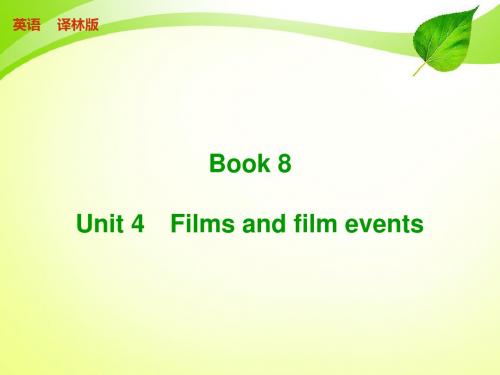
盗取→ robber n.抢劫者,强盗
基础知识排查
重点单词突破
重点短语突破
句法与语法突破
高频考点
基础知识排查
19. accumulate
/ə′kjuːmjəleI t/ vt.& vi.积累,积聚;逐渐
增加→ accumulation n.积累,积聚 20. fierce 的→ /fI əs/ adj.激烈的,猛烈的;凶狠的,凶猛 adv.凶猛地;猛烈地,激烈地
accumulated (积累) much
experience of teaching before he retired.
基础知识排查
重点单词突破
重点短语突破
句法与语法突破
高频考点
重点单词突破
重点掌握的单词
1.expose v.暴露;揭露;使曝光;使接触
expose...to使显露;暴露 be exposed to暴露于;经受„„ expose sb.to...让某人接触某物;使某人暴露于„„
基础知识排查
重点单词突破
重点短语突破
句法与语法突破
高频考点
重点单词突破
They had not been exposed to most diseases common to urban populations. 城市人口中多数常见的疾病他们都没有接触到。 These units exposed children to many viewpoints of a given issue. 这些单元让孩子们接触到有关某一特定问题的多种观点。
2.Not by accident,she
deliberately (deliberate)
broke that beautiful vase. 3.I send you my warmest congratulations (congratulate) on your success.
人教版八年级下册英语Unit4知识点语法归纳总结

⼈教版⼋年级下册英语Unit4知识点语法归纳总结Unit 4 Why don’t you talk to your parents?1.短语归纳2.典句必背3.⽤法集萃(1)My parents don't allow me to hang out with my friends. 我的⽗母不允许我和我的朋友们出去闲逛。
?allow作动词,意为“允许;准许”。
allow sb. to do sth. 意为“允许某⼈做某事”,也可以是allow sb. sth.例:His parents won't allow him to stay out late. 他的⽗母不允许他在外⾯待到很晚。
Each passenger is allowed 20 kilograms of baggage. 每位旅客准许携带20千克⾏李。
allow sb. to do sth.的被动结构是:“sb. be allowed to do sth.” 某⼈被允许做某事例:We are allowed to choose our own clothes. 我们被允许选择⾃⼰的⾐服。
The children are not allowed to play on this lawn. 孩⼦们不准在这块草地上玩耍。
(2)What’s wrong?怎么了?wrong作形容词,意为“有⽑病的;错误的”例:There’s something wrong with my bike. 我的⾃⾏车出⽑病了。
I’m sorry to tell you that your answers are wrong. 我很遗憾地告诉你,你的答案错了。
拓展:wrong的延伸(3)I’m really tired because I studied until midnight last night.我真的很累,因为我昨天晚上⼀直学习到半夜。
because是连词,意为“因为”,引导原因状语从句。
book8unit4

1. My old classroom was interesting because three side of the classroom were made from glass. I enjoyed sit close to the windows and looking at the view. On the left-hand side of the class, I could easy see the football field. In the morning, it was full of students exercising. The view from the back of the classroom is also splendid. Close to the school there was a beautiful park with many trees around them. Farther in the distance, I could not enjoy the view of snowy mountains. On the right side of the class was the road. I was always interested to see the drivers in hurry in the morning. The position of the classroom with its view made me felt like I was dreaming. If I was only a child when I studied in that classroom, I will never forget it.1. side-sides2. from-of3. sit-sitting4. easy-easily5. is-was6. them-it7. not 删除8. in hurry- in a hurry9. felt-feel 10. If-Although/Though2. My soccer coach retired in last week. I wanted to do anything special for him at his retirement party. My mum made the better biscuits in the world, so I decide to ask her for help. Mum taught me some basic step of baking. I insisted on doing most of the baking myself. I thought the biscuits were really well. My only mistake was that I dropped some on the floor after I was packing them up. At a party, my coach, with a biscuit in his mouth, asked surprisingly who made them and joked, “I might have to retire again next year just get some more of these biscuits.”My favorite picture at the party is of my coach and me enjoy the biscuits with happy laughter!1. 去掉in2. anything 改为something3. better改成best4. decide改成decided5. step 改为steps6. well改成good7. after改成when/while8. a改为the9. just后加to10. enjoy改为enjoying。
- 1、下载文档前请自行甄别文档内容的完整性,平台不提供额外的编辑、内容补充、找答案等附加服务。
- 2、"仅部分预览"的文档,不可在线预览部分如存在完整性等问题,可反馈申请退款(可完整预览的文档不适用该条件!)。
- 3、如文档侵犯您的权益,请联系客服反馈,我们会尽快为您处理(人工客服工作时间:9:00-18:30)。
强调句强调是为了对一定语境下的部分内容进行突出而采取的一种修辞手法。
强调方式有很多种,主要是为了突出信息。
有些是语法上的需要,同时也对信息起到强调作用。
强调句的常见用法如下:1. 用强调句型:“It is(was)+被强调的部分+that(who)+原句其它部分”来强调说话人的意愿。
对主语进行强调:It was I that/who didn’t realize all my mistakes until you told meyesterday.对宾语进行强调:It was all my mistakes that I didn’t realize until you told me yesterday.对状语进行强调:It was not until you told me yesterday that I realized all my mistakes.2. 用助动词“do/does/did+动词原形”来表示强调:He does know the place well. 他的确很熟悉这个地方。
Do write to me when you get there. 你到那儿后务必给我来信。
3. 用形容词very,only,single,such等修饰名词或形容词来加强语气:That’s the very textbook we used last term. 这正是我们上学期用过的教材。
You are the only person here who can speak Chinese. 你是这里唯一会讲汉语的人。
Not a single person has been in the shop this morning.今天上午这个商店里连一个人都没有。
How dare you buy such expensive jewels? 你怎么敢买这么贵的宝石呢?4. 用ever,never,very,just等副词和badly,highly,really等带有-ly的副词来进行强调:Why ever did you do so? 你究竟为什么要这么做?He never said a word the whole day. 一整天,他一句话也没说。
You’ve got to be very, very careful. 你一定得非常、非常小心。
This is just what I wanted. 这正是我所要的。
He was badly wounded. 他伤得很严重。
I really don’t know what to do next. 我的确不知道下一步该怎么做。
5. 用in the world,on earth,at all等介词短语可以表达更强的语气(常用于疑问句):Where in the world could he be? 他到底会在哪儿?What on earth is it? 它究竟是什么?Do you know at all? 你到底知不知道?6. 用感叹句来表示强烈的感情,突出说话人的情感:How interesting a story it is! 这是一个多么有趣的故事啊!What a beautiful day! 多好的天气啊!7. 用倒装句(也就是将要强调的句子或被强调的部分置于句首)来加强语气:On the table were some flowers. 桌上摆着一些花。
(强调地点)Many a time have I climbed that hill. 我多次翻过那座山。
Only in this way, can we solve this problem. 只有这样,我们才能解决这个问题。
8. 用If来表示强调:1)If从句+I don’t know who/what, etc. does/is/has, etc.;主语部分也可以用nobody does/is/has, etc. 或everybody does/is/has, etc. 来代替(这里的if从句往往是正话反说,反话正说):If he can’t do it, I don’t know who can.要是他做不了这件事,我不知道还有谁能做。
(强调只有他能做)If Jim is a coward, everybody is.要是吉姆是个胆小鬼,那么人人都是胆小鬼。
(强调吉姆不是胆小鬼)2)if从句+it be主句(把所要强调的内容放在it be的后面,把其它内容放在由if引导的从句中):If anyone knew the truth, it was Tom. 如果说谁了解事实的真相,那便是汤姆。
If there is one thing he loves, it is money. 如果说世界上还有他爱的东西,那便是金钱。
强调的类型、结构及例句强调的类型、结构的相关训练强调句型的被强调成分及例句强调句型的注意点及例句强调句型的注意点的相关训练强调句型与定语从句等的比较强调句型与定语从句等的相关训练强调句与主语从句1) It is Maths ________ not all girls are good at.2) It is obvious ________ not all girls are good at Maths.A. thatB. whichC. whatD. /Keys: A Anot until 强调句与倒装句1) It was not until the teacher came close ______.2) Not until the teacher came close______.A. that he noticed herB. did he notice herC. that he didn’t notice herD. didn’t he notice her Keys: A B练习:一、单项选择:1. It will be three years ________ we get together again.A. thatB. whenC. sinceD. before2. It was through Xiao Li ____ I got to know Xiao Wang.A. whoB. whomC. howD. that3. It was in the rice fields ____ we had our league meeting.A. whereB. thatC. in whichD. on which4. It was on October 1st ____ new China was founded.A. whichB. whenC. asD. that5. Was it because he was ill ____ he asked for leave?A. andB. thatC. that’sD. so6. Mary speaks in a low voice; ____ is difficult to know what she is saying.A. itB. thatC. soD. she7. It was ____ I met Mr Green in Shanghai.A. many years thatB. many years beforeC. many years ago thatD. many years when8. ____ is not everybody ____ can draw so well.A. It, allB. It, thatC. There, whoD. There, that9. It’s the third time ____ I have been here.A. thatB. whenC. afterD. who10. It was simply for that reason ____ I wouldn’t tell him the truth.A. whyB. whichC. soD. that11. —Was it in 1969 _____ the American astronaut succeeded _____ landing on the moon﹖— Quite right.A. when; onB. that; onC. when; inD. that; in12. It was _____ he said _____ disappointed me.A. what; thatB. that; thatC. what; whatD. that; what13. _____ is no possibility ______ Bob can win the first prize in the match.A. There; whetherB. It; thatC. There; thatD. It; whether14. —Where was you picked up the wallet﹖—Just near the school gate.A. itB. it thatC. the placeD. the place that15. I must find out why so many students made the same mistake.A. is it thatB. was it whichC. it is whatD. it was that16. is a fact that English is being accepted as an international language.A. ThereB. ItC. ThatD. This17. Our classroom is very clean. Do you know who cleaned it﹖A. was it thatB. it was thatC. was it whoD. he was18. Is it in the factory you visited last week this kind of car is made﹖A./;thatB. where;whenC. where;thatD./;when19. It was _____ 1920 regular radio broadcasts began.A. until; whenB. not until; whenC. until; thatD. not until; that20. It is ten years ________ Miss Gao returned to China.A. thatB. whenC. sinceD. as21. Was it in the place ____ the last emperor died?A. whereB. thatC. whichD. in which22. It ____ Mike and Mary who helped the old man several days ago.A. wasB. wereC. areD. had been23. He said, “____ a long way to school. ____ a long way to go yet before we arrive.”A. It is, It isB. There is, There isC. There is, It isD. It is, There is24. It was about 600 years ago ____ the first clock with a face and an hour hand was made.A. thatB. untilC. beforeD. when25. It was not until she came to see us ____ her mother was ill in bed.A. when we knewB. that did we knewC. that we knewD. that did we know26. It was 20 years ago ________ the two friends met in Viet Nam.A. whenB. beforeC. sinceD. that27. It will be 20 years ________ they meet in Viet Nam.A. whenB. beforeC. sinceD. that28. It is 20 years ________ he came to live here.A. whenB. beforeC. sinceD. that29. It was not long ________ the people in Austria took up guns.A. whenB. beforeC. sinceD. that30. It was midnight _______ he came back home.A. whenB. beforeC. sinceD. that二、翻译句子。
